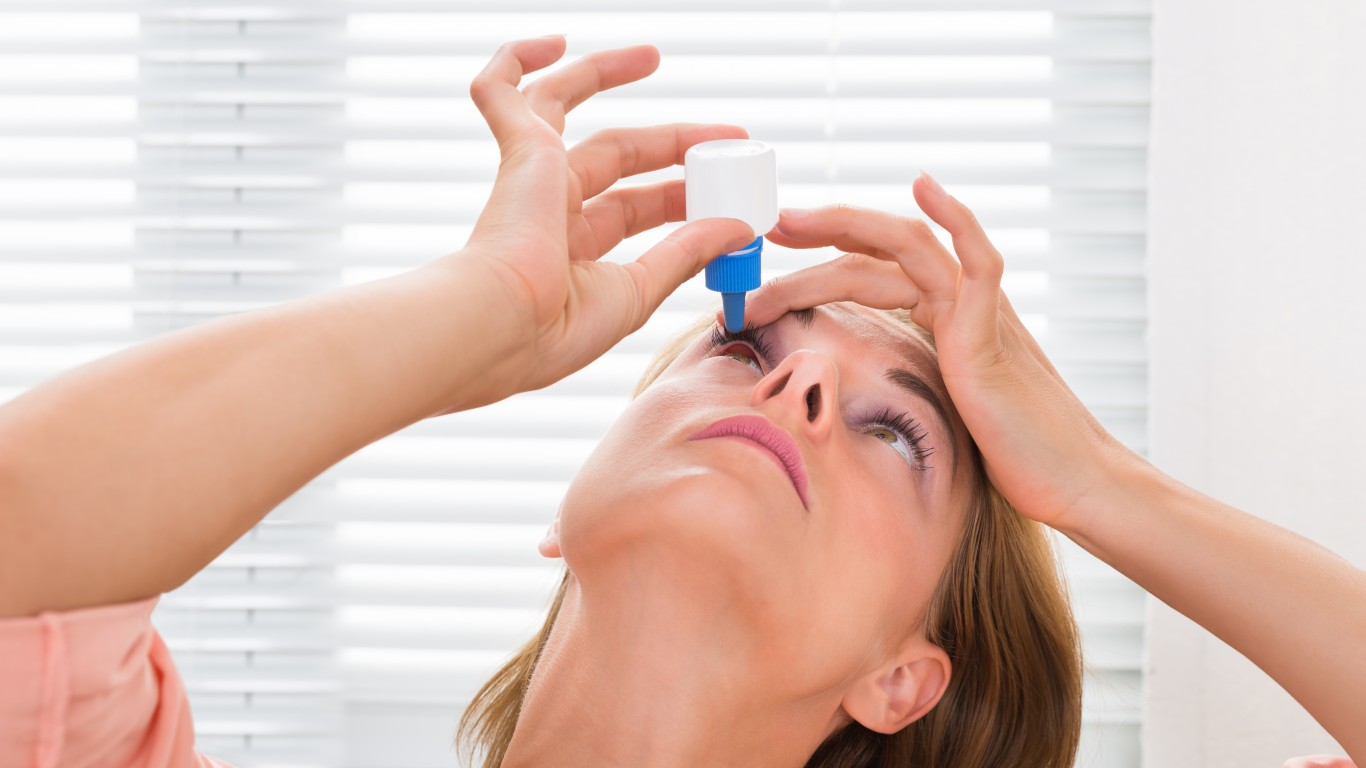Health and Healthcare
CVS, Walgreens Get FDA Warning for Selling Unapproved Eye Drops

Published:

The U.S. Food and Drug Administration (FDA) announced Tuesday that it has sent warning letters to eight companies the agency said are violating federal by manufacturing or marketing unapproved eye treatment products. Among the eight are two giants: CVS Health and Walgreens. (These 20 American companies have the worst reputations.)
In its letter to CVS CEO Karen Lynch, the FDA singled out CVS Health Pink Eye Relief Drops, sold on the company’s website but not approved for sale in the United States. The drops are “not generally recognized as safe and effective (GRASE) for its … referenced uses and, therefore, this product is a ‘new drug’ under FDA regulations” and “may not be introduced or delivered for introduction into interstate commerce without an approved application from FDA in effect.”
In its marketing of the drops, CVS refers to the product as a “homeopathic drug.” The FDA is not impressed: “Homeopathic drug products are subject to the same statutory requirements as other drugs,” including FDA approval.
CVS has 15 working days from the letter dated Monday, September 11, to notify the agency in writing of the steps CVS has taken to correct the violations. The FDA will consider extending the deadline if the company asks.
Walgreens CEO Stefano Pessina was warned that three of the company’s eye products, Walgreens Allergy Eye Drops, Walgreens Stye Eye Drops and Walgreens Pink Eye Drops, are also unapproved, should also be considered to be “new drugs” and cannot escape FDA regulation because Walgreens markets the drops as homeopathic drugs.
Likewise, both CVS and Walgreens also use contract manufacturers to make the products. Both are, therefore, responsible for making sure the drugs they distribute are not adulterated. These particular manufacturers have violated the FDA’s good manufacturing practice requirements in making homeopathic products and have, on their own, received warning letters from the FDA.
In a footnote to both CVS and Walgreens, the FDA notes that the companies use silver sulfate as a preservative in the eye drops. This is a concern to the agency because ophthalmic preservatives are required to be “suitable and harmless.” Silver sulfate does not fit the bill:
The Agency has significant concerns regarding the safety of silver sulfate for use as an ophthalmic preservative. Long term use of medicinal compounds containing silver may cause argyria, which is a blueish-gray discoloration of the skin and eyes that is irreversible. Additionally, granular deposits of silver in the conjunctiva and cornea may cause decreased night vision.
The other six companies to receive warning letters were Boiron, DR Vitamin Solutions, Natural Ophthalmics, OcluMed, SimilasanAG/Similasan USA and TRP Company.
Credit card companies are pulling out all the stops, with the issuers are offering insane travel rewards and perks.
We’re talking huge sign-up bonuses, points on every purchase, and benefits like lounge access, travel credits, and free hotel nights. For travelers, these rewards can add up to thousands of dollars in flights, upgrades, and luxury experiences every year.
It’s like getting paid to travel — and it’s available to qualified borrowers who know where to look.
We’ve rounded up some of the best travel credit cards on the market. Click here to see the list. Don’t miss these offers — they won’t be this good forever.
Thank you for reading! Have some feedback for us?
Contact the 24/7 Wall St. editorial team.